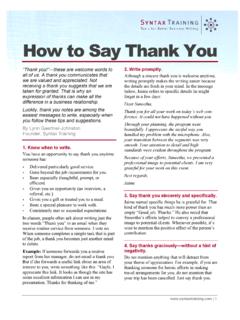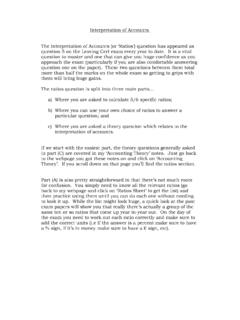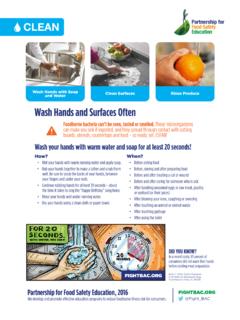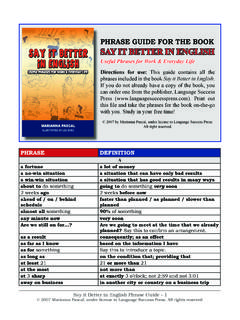Transcription of Yes, It’s OK To Say No!
1 1 Yes, It s OK To Say No! How to prevent the over commitment that leads to overwhelm by Sue Johnston No! It s a small word, yet a powerful word, one with big consequences. It s a word that can improve our lives and make us more valuable to those we say it to those we want to help in this world. At the end of a week in which I and the feelings I was experiencing seemed to be on a non-stop rush from appointment to commitment to obligation to ordeal, I stopped to reflect on what was making me feel so examined my To Do list, and highlighted the things I really wanted to do. Almost all the highlighted items had fallen (or were they pushed?)
2 To the bottom of the page. Activities that were important to me had, for months, languished, ignored and forgotten, beneath activities that other people wanted me to do. Ouch It had something to do with my reluctance to use the word No. A little reading and a lot of reflection showed me: That NO is not a dirty word How to say NO without feeling guilty And why saying NO increases the value of the things we say YES to. How does it happen? Look at your own To Do list. Are your Want To Do activities sinking to the bottom of a seemingly endless ocean of what other people want? Why is it so hard to say No to people s requests for our help?
3 When we were two years old, saying No was never a problem. Saying No was our job. It signalled the beginning of our lives as individuals. As we toddled into our older years, we learned that saying No wasn t really acceptable. We took to heart those slogans posted on the schoolroom walls that said things like, It s nice to be important, but it s more important to be nice. It s hard to argue with such phrases. Giving and doing things for other people is essential for our community and for our spirits. As Albert Camus wrote, It is normal to give away a little of one's life in order not to lose it all.
4 But some of us go too far. Saying Yes to all reasonable requests can wear us out. We give so much that we have nothing left to give. Worse, we have nothing for ourselves. If we use up our energy, but don t refuel, it leads to exhaustion, crankiness, burnout, and mistakes. That sort of stuff doesn t really help anyone not us and not the people we ve said Yes to. In our work whether it s paid or voluntary a lot of people are asking for our time, and there s only so much time to go around. Even if we had three lifetimes, most of us couldn t get to all the things other people want us to do for them.
5 But a lot of us try. Saying No makes us feel guilty. We want to be nice. It s Understood Communication http://itsunderstood com 2 I m not saying we stop being nice; however, we need to make a distinction between pleasing others and true service. Can you be too nice? When we say Yes to please others, because we need approval, or don t want a confrontation, or don t want to seem selfish, we cause ourselves stress. The task becomes a chore, an obligation, rather than a pleasure. We may resent the other person for asking us to do something, and be angry with ourselves for agreeing. When we say Yes based on a thoughtful desire for service, our experience is more satisfying and we reap inner rewards.
6 In other words, our heart must be in it. As Mother Teresa said, It's not how much we give but how much love we put into giving. Millions of people suffer from what author/psychologist Harriet Braiker describes in her book, The Disease To Please (McGraw Hill). They are so addicted to the approval of others, and so fearful of anger, confrontation and rejection that they agree to every request with serious physical and emotional consequences. These people-pleasers think they re good at making other people happy; but their real talent lies in making themselves miserable. Is it not better to say No to someone s request than to be overworked and stressed, just to appear nice?
7 Saying No is often the most generous thing to do. Asserting ourselves frees us from making shallow and insincere commitments, and it ensures we commit to things we can really put our hearts into. Can you say, Yes and mean it? This doesn t mean it s right to say No to everything. We say, Yes to the things that matter to us. We say yes to the things that will inspire some joy in giving. The cost of saying Yes when we want to say No can be high. Every time we agree to one thing, we are refusing something else. We make tradeoffs. We don t get enough sleep or exercise, don t spend enough time with friends or family, or don t get to the project we really wanted or needed to work on.
8 Or we short-change everything and quality suffers. I m not advocating that we turn down all requests that come our way. What I do believe is that we need to understand what we are saying Yes to and why. That makes our Yes valuable. So how do we do it? How do we say No, effectively, so that we can really mean it when we say Yes ? First, we have to practise. This is a new role, so it helps to rehearse. No kidding. Say it out loud, No, I can t do that for you. Do that a few times, so you know your mouth can actually produce the words. Next learn the various forms of No and the context for using them.
9 1. The DIRECT NO - No, I can t help you promote that concert. Used when you lack the time or will to do something. 2. The REFLECTING NO Here you acknowledge the content and feeling. I know you were counting on me to help you promote that concert. Unfortunately, I just can t do it this year. 3. The REASONED NO Give a brief and genuine reason for refusing, without opening up negotiations. No, I can t help you promote the concert. I have two big projects due in March. 4. The BROKEN RECORD NO This is used when someone is trying to wear you down by begging, or trying to sweeten the pot. No, I can t help you with this concert.
10 It s Understood Communication http://itsunderstood com 3 But nobody does publicity as well as you do. No, I can t help you with this concert. But I promise the committee will be better organised this time. No, I can t help you with this concert. I ll buy you lunch. No, I can t help you with this concert. But who else will do it? I don t know, but I know I can t help you with this concert. 5. The PAIN NOW OR PAIN LATER NO I m not sure how my schedule will shape up so it s better if I say No today than to let you down closer to the concert. 6. The NO SANDWICH This is the nicest No, really Yes-No-Yes.








